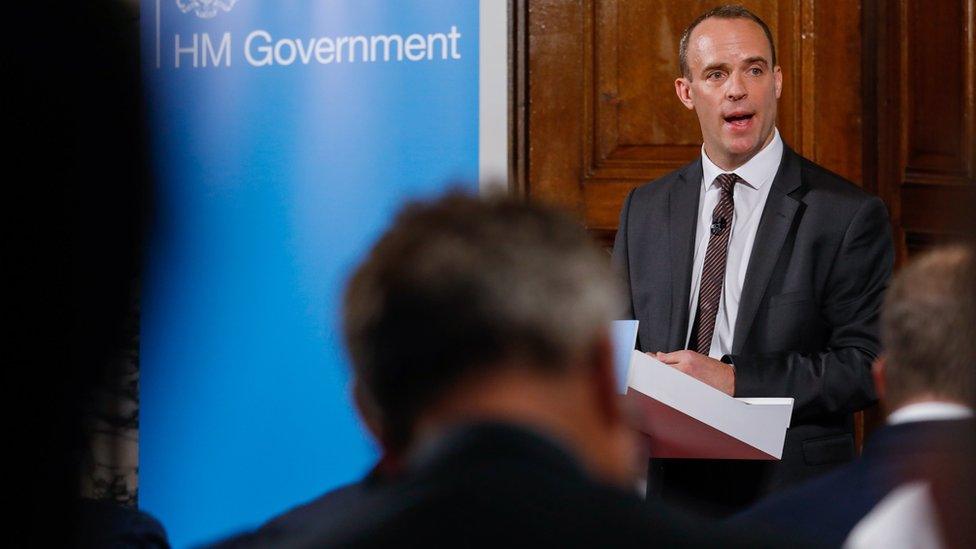An uncomfortable moment for Raab?
- Published

This didn't seem a comfortable moment for Dominic Raab.
The Brexit secretary campaigned for Leave, and is a true believer in the cause. Yet here he was, setting out plans to cope with a British failure to reach the kind of deal Brexiteers once claimed would be easy to accomplish.
Again and again, the Brexit department's guidance refers to the "unlikely event" of Brexit without an EU deal - but Dominic Raab conceded it could happen.
The risk was real. The International Trade Secretary, Liam Fox, has suggested that outcome is more likely than not. The Brexit secretary may disagree on the level of risk, but could not deny that it would lead to higher costs and a fresh burden of red tape on businesses, scientific and medical research and individuals.
In today's first tranche of advisory papers on how to handle a no-deal Brexit, we learned card payments in Europe could cost more, as the EU cap on charges disappeared. That would add to the holiday and travel expenses of millions of Brits.
There was no guarantee yet of Brits and other UK dwellers on the continent having the same access to bank accounts and pension payments. Again Mr Raab was looking on the bright side. Why would the EU refuse to co-operate and risk piling identical burdens on Europeans in Britain.
The list went on. And on. Medicines were being stockpiled - though that didn't rule out the possibility of shortages.
And on the potential effect on UK firms involved in trade with the EU, the message was no less striking for being an inevitable consequence of quitting the EU single market and operating under the rule of the World Trade Organisation in the absence of a free trade agreement. Exporters would face an entirely new system of customs duties and safety declarations at a stroke. Consultants would need to be consulted. Software bought. Contracts rewritten.
'Within sight'
Yes, farmers who receive EU subsidies could count on those payments being continued by a newly liberated Department for the Environment, Food and Rural Affairs. Whether the same farmers would be entirely happy with the new schedule of tariffs on agricultural imports and exports is another matter, and not discussed today.
The list of new home-grown rules and regulatory agencies was huge. Mr Raab's hope was that the EU would co-operate with and recognise this new sprawling network of agencies and authorities, not for Britain's sake, but in its own interests. Maybe. But who knows?
The minister hoped and believed an agreement was still the most likely outcome. The two sides, he said, were "within sight" of a deal. Some close to the process might consider that an optimistic assessment. Theresa May's Chequers plan - a single market for goods but not services among other things - seems to have fallen rather flat in Brussels.
Dover is, after all, "within sight" of Calais. The political distance may turn out to be unbridgeable. So far, there's no sign of Brussels weakening on its negotiating "red lines". Today's "no-deal" plans may seem extensive, and there is much more to come.
To Dominic Raab the idea that everything will work out in the end seems plain common sense. The potential disruption and costs former Remainers and Brexit sceptics see as national self-harm, Brexiteers see as a few bumps in the road en route to a brighter future.
Dominic Raab may be a more comfortable colleague for the prime minister to deal with than his predecessor, David Davis, but he is a true believer nonetheless. You could call his conviction a product of faith. Or, if you prefer, call it wishful thinking.